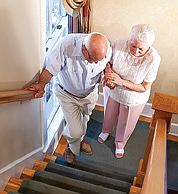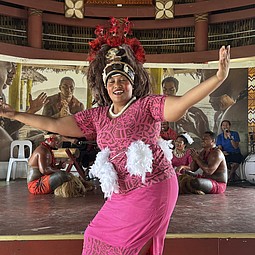Age-Friendly Housing: How is Your Relationship With Your Home?
April 29, 2018 at 5:54 p.m.
This article is brought to you by AARP Washington
Home is where the heart is. It is more than a structure built of wood or brick or steel. It is where we surround ourselves with belongings that give us comfort and inspiration. It is where we make memories with family and friends. For those fortunate enough, a residence can adapt through different life stages to be the home that we need at any given time.
But our lives aren’t as static or predictable as they once were. For starters, we are living much longer than previous generations, which means our homes can become a safety hazard as we age. In addition, our idea of family has expanded. Married children are moving back home with parents. Parents are moving in with children. Three, even four generations living under one roof is not as uncommon as it once was. In addition to these societal changes, economic pressures play a significant role in our housing futures. For instance, property taxes have increased exponentially which has left many older residents wondering if they can afford to stay in their communities.
Check into property tax exemptions and tax deferrals for low-income seniors, retired disabled citizens and veterans in Washington State. Find out more through your local assessor. Lists of offices are available from the Washington Department of Revenue at www.dor.wa.gov/find-taxes-rates/property-tax.
Another big concern as communities work to create a more age-friendly environment is the safety of older adults. According to the National Floor Safety Institute, every year in the U.S. one of every three persons over the age of 65 will experience a fall. Most homes that we live in today are not equipped to handle the needs of an aging population. However, most people don’t discuss or think about the age- appropriateness of their home until a crisis occurs.
Rebuilding Together (RT) is one local resource committed to helping low-income older adults, veterans and people with disabilities age in their own homes. Interested parties submit an application for repairs, which are reviewed during a site visit along with an additional checklist of 25 repair priorities for safety. Depending on needed repairs, RT will either connect the homeowner with their Safe at Home volunteers or schedule a large Team Build or Spring Rebuilding event for more complicated modifications. www.rebuildingtogether.org
“Our most often identified repairs to assist with aging in place are installing hand rails and bathroom grab bars; removing carpet and replacing with smooth surface flooring and ADA ramp construction,” says Mike Lahoda, Director of Programs at Rebuilding Together Seattle.
Repairs and modifications help make a home more livable by incorporating the principles of "visitability" and universal design. A visitable home requires three basic features including one zero-step entrance, doors with 34 inches of clear passage space, and one bathroom on the main floor accessible by wheelchair. Universal design encompasses much more from replacing doors, faucets and handles to moving or removing throw rugs, electric cords and other barriers like furniture. AARP’s HomeFit guide at www.aarp.org/homefit provides a checklist of age-friendly changes for both tenants and homeowners.
Housing improvements are also part of the region’s commitment to be a community that accommodates all ages. Home repair programs include grants and low-interest loans that can be used to pay for interior and exterior repairs. To qualify, homeowners must be residents of Seattle with an income at or below 50% of the area’s median income. Seattle, King County and other communities have repair programs for homeowners and tenants. Tenants often have a more difficult time convincing landlords to make reasonable accommodations to remain in their rental units. But the King County repair program for special-needs renters helps by offering grants to help modify existing rental units. More local groups are available to help with minor repairs, for renters and home-owners alike.
For some, home modifications won’t be enough to facilitate aging in place. For others, large single-family homes are no longer desirable for a number of reasons, including care and maintenance. Those who are interested in age-specific residences such as retirement communities should start researching long before the move is planned. Consider what type of community you want and what your future needs may be. There are several resources available to help make a list of “must have” and “nice to have” amenities. A helpful place to start is www.retirementconnection.com, which offers a printed and online resource guide about local area communities. They can be reached by phone at (800) 462-1316.
Bottom line? An age-friendly community has affordable options for households with varying income levels and has homes with design features to accommodate people with limited mobility. If aging in place isn’t right for you, check out some of the other trends for housing. The article “Alternative Housing for Seniors” (northwestprimetime.com/news/2018/mar/31/alternative-housing-seniors/) in the April edition of Northwest Prime Time details several options that are available in our surrounding community. Or check out www.northwestprimetime.com/housingguide/ for those contemplating a move to retirement housing communities.
If you would like to delve deeper into the housing issue, the King County Library System has compiled a booklist of resources on the topic of housing and community at kcls.org/housing.
Resources
• Seattle residents can learn more about the city repair program at www.seattle.gov/housing/homeowners/home-repair. Phone: (206) 684-0244.
• Check with King County about its Housing Repair program for renters and homeowners https://www.kingcounty.gov/depts/community-human-services/housing/services/housing-repair.aspx. Phone: (206) 263-9095
• Learn more about Rebuilding Together’s services at www.rebuildingtogether.org. Chapters are available in Seattle, Tacoma and Olympia. Phone: (800) 473-4229
• Sound Generations provides home resources for older adults including minor home repairs as well as information about saving money on your utility bills at www.soundgenerations.org. Phone: (206) 448-5757
• For information about home repair assistance beyond King County, visit www. washingtoncommunitylivingconnections.org and search by zip on “Home Maintenance and Minor Repair Services.”






